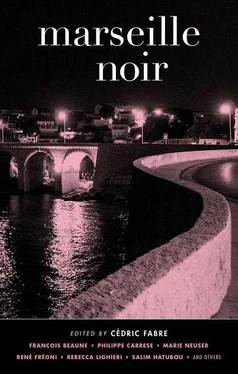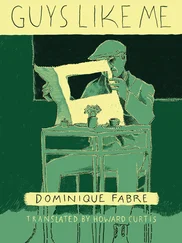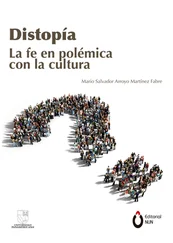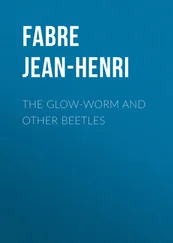Cédric Fabre - Marseille Noir
Здесь есть возможность читать онлайн «Cédric Fabre - Marseille Noir» весь текст электронной книги совершенно бесплатно (целиком полную версию без сокращений). В некоторых случаях можно слушать аудио, скачать через торрент в формате fb2 и присутствует краткое содержание. Год выпуска: 2015, Издательство: akashic books, Жанр: Крутой детектив, на английском языке. Описание произведения, (предисловие) а так же отзывы посетителей доступны на портале библиотеки ЛибКат.
- Название:Marseille Noir
- Автор:
- Издательство:akashic books
- Жанр:
- Год:2015
- ISBN:нет данных
- Рейтинг книги:5 / 5. Голосов: 1
-
Избранное:Добавить в избранное
- Отзывы:
-
Ваша оценка:
- 100
- 1
- 2
- 3
- 4
- 5
Marseille Noir: краткое содержание, описание и аннотация
Предлагаем к чтению аннотацию, описание, краткое содержание или предисловие (зависит от того, что написал сам автор книги «Marseille Noir»). Если вы не нашли необходимую информацию о книге — напишите в комментариях, мы постараемся отыскать её.
Marseille Noir — читать онлайн бесплатно полную книгу (весь текст) целиком
Ниже представлен текст книги, разбитый по страницам. Система сохранения места последней прочитанной страницы, позволяет с удобством читать онлайн бесплатно книгу «Marseille Noir», без необходимости каждый раз заново искать на чём Вы остановились. Поставьте закладку, и сможете в любой момент перейти на страницу, на которой закончили чтение.
Интервал:
Закладка:
At first he hadn’t noticed it but then, little by little, that was all he could see.
The crack.
A rat who lived in his building saw him leaving one day, earlier than usual and saw him come back at night, later than usual, with his face somehow undone and an expression of disappointment in his eyes. The rat didn’t know what the expression meant but he could see he was no longer the same man. Anyway, the rat couldn’t care less about the man and his frustrations.
Something had happened, a veil had been rent and the man no longer appreciated the sun and the blue sky, he observed the women walking and found them heavy and graceless, the pastis had lost its taste, the fish market no longer held any charm, discussions with friends were reduced to their most rudimentary form and besides soccer and a few shrugs, there was no communication. He tried to fight it and talked about literature, philosophy and even poetry in hopes of having an interesting conversation but they just looked at him and said stupid things. He was getting bored.
Dégun, engatser, cagole, boulègue, emboucaner, parler meilleur, pourrave, maronner, chourraver, zou, testard, emplâtre, rouscailler, c’est qu’une bouche. The famous Marseille slang, just a lot of chatter.
He saw the chipped, flaking walls, gray from pollution, dirty garbage containers with their lids always open stinking up the whole city, he saw plastic bags hanging on the branches of trees like Christmas decorations, shit from homeless people and dogs on the sidewalks, men pissing against doors and walls, he saw people littering the street instead of putting their trash into garbage cans, he saw metal posts in the middle of the sidewalk to prevent cars from parking on it, forcing people to walk single file to get around them, he saw a city adrift, up to its neck in filth and corruption and liking it, a city where anything was possible, a city drowning in bullshit and he was exasperated and he freaked out.
He thought of himself as a good and polite man, with a true civic sense. His glass was always half full but that evening, when he climbed the stairs to his place, he smelled the stench of urine, his fingers grazed the wall and the cracked paint peeled off, he felt the cold and the moisture because of a leak in the pipes and he remembered all the letters of complaint and then insults he had sent to the management company, to the real estate agency, to lawyers and city hall and how they had promised to fix things, a budget had been set aside and all they were waiting for were the workers but he was still waiting, nothing was ever done. His friends said he shouldn’t be in such a rush, he had to give time some time, the time to be. His friends lived as slowly as they walked, they waited patiently for death, that’s the way they saw themselves but he saw them otherwise, he saw the waste of life.
The rat didn’t know what had happened, he couldn’t discern what made sense and what didn’t because he was a rat and he didn’t follow the man wherever he went, nor did he think like him, he remained holed up under the garbage cans, under the dumpsters, that was his kingdom and from this roomy kingdom he saw the man go by, looking lost. The rat too was fat, he moved slowly, sure of himself, he ate a lot and had never known hunger, he was a rat made in Marseille.
A few days earlier, standing on a corner in the Vieux-Port where he had once again observed the lid they called a roof or a shade-giver or a gigantic upside-down mirror so people could see themselves and take a selfie, which was the irrefutable proof that Marseille was more or less experiencing modernity, the man forgot to verify if the cars had actually stopped at the light before he stepped off the curb. They had warned him when he arrived in Marseille that people were rebellious to the core and you couldn’t cross even when the light was red without checking to make sure that cars had actually stopped, the issue wasn’t really a lack of civic spirit but a sort of prideful disobedience, a matter of principle. They had said nous, les Marseillais and he had been proud. He had always seen himself as a rebel, so he liked this way of defining Marseille and when a car didn’t stop at the light, he had just enough time to tell himself it was a city made for him, a perfect match, when he was thrown into the air, fell heavily onto the asphalt and banged his head as the car sped away. He was alive, he had been very lucky, too bad for him. When a paramedic shook him, his first reflex was to ask what happened and when the paramedic had stopped telling him about his adventures, his next reflex was to ask where the driver of the car that had practically killed him was. The police had closed off the area and were redirecting traffic while a crowd gathered. One of the policemen explained that there was no way for them to get their hands on the driver, he should try to forget the accident, he was okay and that was the main thing, being okay and he had to understand that the police were overwhelmed, so why press charges, no point wasting energy and anyway, with a good pastis, he would feel better. Shaken up by his accident, he agreed, of course.
Later, when he was having a drink with his friends, they told him that the car almost certainly belonged to a cop, they had recognized him. Hey, that’s the way it is and they laughed stupidly.
He saw and became aware that their laughter was stupid and he lost his sense of humor.
Far from being rebellious, Marseille now appeared to him like a city where people got bogged down and grew dumber by the day. He tried to fight those wicked thoughts and prove to himself that the city didn’t have that kind of influence on him, that it was all in his head and to avoid people, he went out for a walk early in the morning, probably too early since it was the time when the garbagemen having already cleaned the city gave themselves what they thought was a well-deserved cigarette break, leaving behind them a jumble of refuse and open garbage cans, the asphalt was slippery and dirty because they watered it down but never cleaned it and the detritus melted into a stinking paste. He would walk by them every morning and to show that he too was participating in cleaning the city, he would pick up trash from the ground, put it in the containers and close the lids and when the garbagemen did not react, he would ask them why they watered the asphalt like a garden when it was not a garden, why they didn’t put the lids back on, why they didn’t pick up the stuff, why they didn’t clean and they made fun of him and turned their backs on him. He told them that this was no way to act, everybody suffered from the filth but the garbagemen responded with indifference and shrugs, they didn’t care at all, they had work waiting for them at their cousin’s place, their brother’s, or a buddy of theirs. Done and gone, that’s what you called the special treatment accorded to the garbagemen by city hall or perhaps the regional council, nobody really knew who was in charge of what in Marseille, things were often vague. The man went to see the driver of the little tourist train and explained that he should avoid the streets behind the Vieux-Port and their mountains of garbage so as not to frighten the tourists because, subsequently, the city would get even poorer and be swallowed up in the economic fault line but the driver merely shook his head.
In Haiti too they had a problem with the accumulating garbage which was understandable, they had nobody to clean it up, no garbage truck or men to pick it up and make it mysteriously disappear, no place to hide the trash, all they had was poetic words to name filth, they called it fatras and that wasn’t so bad because in Marseille they didn’t even have the poetic words, they had disappeared into a dumpster. He said to himself that it did not make him feel any better to know that it was worse in Haiti and that he had no desire to resemble this city but the dirt was getting under his skin and he washed his hands again and again.
Читать дальшеИнтервал:
Закладка:
Похожие книги на «Marseille Noir»
Представляем Вашему вниманию похожие книги на «Marseille Noir» списком для выбора. Мы отобрали схожую по названию и смыслу литературу в надежде предоставить читателям больше вариантов отыскать новые, интересные, ещё непрочитанные произведения.
Обсуждение, отзывы о книге «Marseille Noir» и просто собственные мнения читателей. Оставьте ваши комментарии, напишите, что Вы думаете о произведении, его смысле или главных героях. Укажите что конкретно понравилось, а что нет, и почему Вы так считаете.












